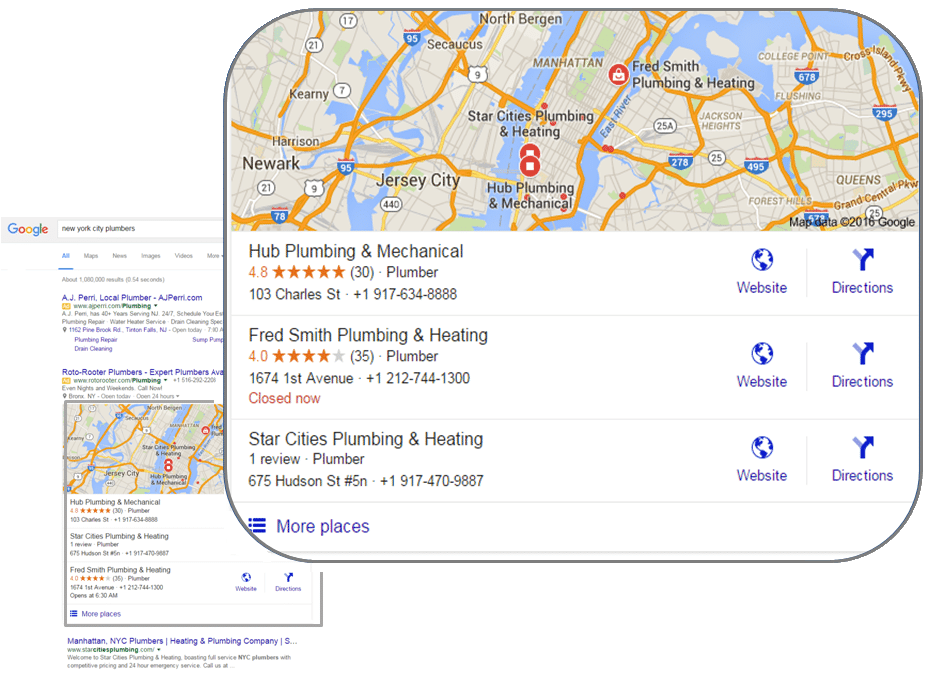As customers have grown accustomed to learning about nearby businesses online, it’s become increasingly important for local businesses to be found where most customers are looking for them.A joint study by ComScore and Neustar Localeze shows that search engines are the most popular source of local business information, and almost half of users searched from a mobile phone. The same study shows that when they conducted their search, 53% use general search terms when looking for products or services nearby.
But just as the importance of showing up on local search results became clear to local businesses, doing so became more difficult in the past year. In August 2015, Google reduced the number of local search results displayed from seven (what SEO’s called the 7-pack) to three (what’s now known as the 3-pack or the snack pack). This has made it even more difficult for local businesses with more than two nearby competitors to show up on local search results.
This means that for clients to take one of these coveted three slots, adopting a Local SEO strategy is crucial. For agencies and digital marketing professionals, it means there’s an opportunity to provide the services that boost the local search presence of local businesses.Although there are several factors that affect ranking on local results, Google does state that it primarily revolves around relevance, distance, and prominence. So in addition to the usual SEO ranking factors, your clients must establish an online presence that signals that their business is prominent in a particular location.
You should of course have clients their Google My Business listing and update it. You can use our Google My Business dashboard to track their website’s performance on local search results. Implement Schema.org markup on their website to include their business name, address, and phone number (NAP). But there are other signals that can indicate your client’s relevance for a keyword in a certain location outside of their websites.
One such signal is a business citation. Citations are mentions of your client’s business information—NAP and others—on other websites. Aside from the information on the business’ website and Google My Business Profile, it’s from these citations that Search Engines determine whether to display a business in local search results. Among , 38% reported that “not having enough information about the business” was the most common issue they encountered, and almost a fifth reported it as the most impactful.
Google uses several data sources to gather citations and determine whether a business is prominent. These can be anywhere from local blogs and online newspapers to industry- and location-focused business directories and government websites. Determining a citation building strategy and the specific websites your client should be mentioned on should always be specifically tailored to that area. However, there are certain best practices that apply anywhere that you and your clients should be aware of.
Accuracy and Consistency

Before implementing a citation building strategy, it’s always important to get the right business information up-front. Each citation should be consistent with the information already on your client’s website. Claiming their Google My Business listing is another an important first step, and you should find out if they’ve done so already, if the information is accurate and up-to-date, and if the other attributes have been optimized for users.
A common pitfall among clients who update listings on their own is creating a duplicate listing. Oftentimes, their business already has an unclaimed listing but with old information (they may have changed locations, phone numbers, etc.). So when they create a new listing with accurate information instead of updating an already existing one, they create inconsistent citations.
Not only do inconsistent citations hurt their chances of ranking on local search results, but it also makes it easier for users to become paying customers. For instance, restaurant owners need to update and verify their information on business listings as part of a holistic local SEO for restaurants. Simply providing directions, operating hours, or contact information will let these users know how they can avail of their products or services.
Since users can also learn about your client’s business on other websites, ensuring accurate citations on these is important as well. Another important step in your local SEO checklist, especially to avoid creating duplicate listings, is to find out if there are any variations of their business information. If their legal business name is, say, Everyman Plumbing, ask if they’ve marketed themselves under different names as well (Everyman Plumbers, Everyman Plumbing Services, etc.). Ask if they’ve changed locations or phone numbers, too.
Building Citations: Quantity and Quality

Aside from claiming listings on search engines like Google and Bing, there are the standard online directories that most if not all local businesses should be listed on. Users could be looking for your client’s business on Yelp, Foursquare, Hotfrog, Yellow Pages, and others.
Your clients shouldn’t be content to list their business on these directories. Their business should be mentioned in relevant local websites as well. Finding out which ones are right for your client requires some local savvy. What local directories, blogs, industry associations, and government websites are relevant to your client? As an agency, this is where your knowledge of the local area comes into play.The more citations your client has on these websites, the better their chances of ranking for local search results.
Of course, not all citations are created equal. 86% of Local SEO experts say that quality of citations is more important than quantity. So even if one of your client’s competitors has more citations, your client still has a chance of beating them to a slot in the Snack Pack if their citations are of higher quality. Each listing has to be vetted for the website’s Domain and Page authority (among others), as these are often indications to search engines that these are more trustworthy sources.
It’s not just about where your clients have citations either. Rich citations—those that provide information beyond the name, address, and phone number (NAP)—provide more useful information to local searchers. Including additional information in citations, such as industry categories, photos, detailed business description, payment details, can help users decide on which business to patronize.
Overall Local Reputation
Citations are an important foundation in building your client’s local presence on search, the channel most of their customers are looking for them. But it’s just one aspect of your client’s online reputation. There’s also the reviews of their business, social media presence, paid search campaigns, their website. Local businesses need to be on top of each one to stay relevant to their customers and competitive in their local markets.
Managing all of these channels is no easy feat. It’s the agencies and digital marketing professionals that can oversee every aspect of their client’s local reputation that can bring real value to their clients, and build the presence and reputation of their own businesses.
SEOReseller provides a Local Reputation Management Tool for its partners to make it easier to manage their client’s online presence. Schedule a walkthrough, or call our toll-free number at 1-800-250-6106 to talk to one of our Project Managers.
